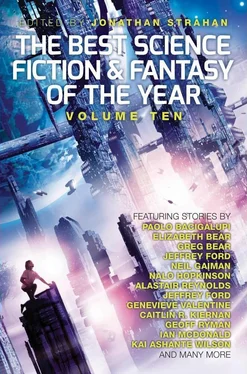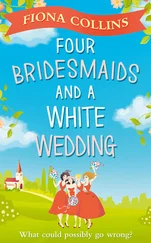The garden has changed more than Clara’s daughter has, since Jeff’s passing. The paths that were once just worn earth have been widened and cleared of weeds. The beds of unnamed flowers that Alice and her husband used to grow have been replaced with vegetable patches and rows of imported exotics. Mulched and weeded and trimmed and fertilised to within an inch of their lives.
“You should keep going,” Alice says to her lover.
“Oh,” he says. “Oh yes, of course! Women’s talk.” He winks at Clara as he moves away. “Don’t do anything I wouldn’t do.”
When he has gone, Alice sighs and settles into a more comfortable position. “The sad thing is, he means it,” she says. “He won’t tolerate me doing anything without consulting him. He calls it communication , when what he really means is him telling me what to do.” She flicks her ears a little to clear away the flies. “It almost makes me glad we’re too different to breed. Imagine us: the parents of the last generation!”
Clara squints into the sun and watches her daughter’s lover still moving from tree to tree, looking up, thinking, then moving on. She is tired of being a visitor already, but Alice asks her all the questions a daughter asks anyway. No, Clara hasn’t heard from her husband of late. Yes, the café is going well. They’ve started a new tradition of monthly dinners. Seasonal dishes, all made with local produce. No, nobody special .
Alice looks across the mudhole to the forest. “I’ve lost track of Dad,” she says. “Wasn’t he out west somewhere, living on a wildlife refuge of some kind?”
“I’d heard that,” Clara said. “Him and that female were working the summers and mostly left alone in the winters. Wandering the hills.”
“Janet,” says her daughter.
“What?”
“Dad’s new partner, her name is Janet.”
She ought not to have come, Clara thinks. Everything her daughter says or asks of her feels like a reproach. Even the gardens are reproachful, the liquidambars arching over the green lawn. The perfect garden beds, the even paths, the vistas like postcards. It was just what she’d dreaded, coming down the driveway, just what she’d been preparing herself for.
Alice wants to show her around the bottom end of the garden, which she says is where Jeff spent most of his time during the last few months of his life. Sometimes, he would fall asleep on the lawn, stretched out like a child and snoring so loudly that the small birds – the fairywrens and tits – would scatter with fear.
“When I woke him up he would always say he hadn’t been sleeping at all,” Alice says. “He’d say he’d been writing. He’d tell me all about whatever it was he had been working on. By the end, the things he told me were just a jumble. A nonsense. But at first I believed him. Or... or I wanted to. He was working on a Cold Equations story, he said. But it was set here on earth, and instead of people, the two characters were rhinos, like us. The two last rhinos on earth. And as soon as one died, the other would become functionally extinct.”
Alice was smiling, as though even now she could hear Jeff working out the shape of his story in her head. “That must be how he thought of us,” she said. “After all those years of being together, of sharing our lives and building this house and this garden. That there was no point to us being together, or having children. That we were just the leftover scraps of something that had once been whole.”
JEFF HAD DIED five years ago, just before the end of the summer, but Clara had not heard about it until six months after that. She got the news in a letter from Janet, her former husband’s new partner, one of the founding members of the Karen Joy Fowler Book Club. They had once met, purely by accident, near a temporary market in Pullington. Janet had been walking away from a dungpile that Clara was going towards and somehow they had gotten to talking. It wasn’t till much later that they had realised they shared a man. In a manner of speaking.
Of course, I know that you knew Jeff far more intimately than I ever did, Janet wrote. But I’ve been surprised by how often I’ve thought about him. His passing makes me think about all of us, how we were, fifty years or so ago, when we didn’t know that it was all going to come to such an ending. We were full of ideas for growing the future – remember that plan Hildy had for forming a partnership with the San Diego Zoo? – and the males were all so ready to charge out into the world and lay down babies wherever they could.
Of course, Jeff wasn’t like that. Not even slightly. He never wanted anyone but his one dear wife; he wasn’t like his father, or any of that generation that were ours to love. Jeff seemed the most vulnerable of us all, even when he was young. I remember I could hardly bear to look at the dark spaces between his skin folds.
Did Janet really think that’s how it had been, for all of them? That, like her, they’d spent their youth getting babies on and from whoever they could? Clara’s memory of those days was that she and her husband had expected to stay together for their whole lives, babies or no babies. Until one of them died and was left to rot in some godforsaken grove of spindle trees. Without a future generation to be mindful of, there was no reason for him to move on after twenty days. He could stay; they could form a pair-bond that would last through as many breeding seasons as they survived.
Clara and Janet had never been close – they had their reasons not to be – but Janet had known where to reach her when Jeff died, and she had kept in touch with Jeff, or with Clara’s daughter. She had known about Jeff’s death, and written to Clara with those strange, true words. Without Janet, Clara might never have known that her daughter’s husband had died. She might still have been keeping her distance, thinking that one day soon she would hear from him, and from her daughter.
THE FIRST TIME she went to Belle’s place it had been to drop off some salad greens she had picked up from a roadside stall on the way home. Belle’s crash was more or less what Clara had expected. Abundant and shabby, her teenage daughters sprawled across the savannah, leaving a trail of unconsciously messy beauty in their wake. Belle didn’t come to greet her, just hallooed her in, and when Clara came through she found the kitchen, unlike the one in the café, a lively and fragrant jungle of ingredients. Belle herself was the least colourful thing. She had taken off the two clanging bangles she wore around her ankles at work and stood in the kitchen barefoot, her skin rough and grey.
Belle’s husband, Robert, poured drinks for all of them. Clara put the greens in a clear space and somehow was invited to stay for dinner. The food Belle served was not as fancy as that she served in the café, and the dinner service was a mismatched collection of hand-thrown pottery pieces. The kind you pick up cheap at garage sales and second-hand stores. Robert kept their glasses full and talked about the fields of grapes he had seen growing on a property out the other side of the reserve. He also told stories about the Scandinavian furniture he had bought cheaply on eBay, especially about a queer couple of Silverbacks from whom he had wrangled a pair of original Thonet chairs. The way he talked about the exchange made it seem scandalous, as though they had propositioned him in some way. Later, when he made coffee, he talked about a workshop he had gone to on ‘cupping’ and tried to teach Clara and Belle how to smell the grounds, insisting that they all drink their coffee sugarless and milk-free in order to better appreciate the flavours of the coffee.
During a pause in the conversation, Clara asked Belle if she had thought any more about whether she wanted to join the Karen Joy Fowler Book Club. Robert leant back away from the conversation, raising an eyebrow at his daughters as if he had been interrupted mid-anecdote, and then listened to his wife talk about the book they were planning to read with studied, careful attention.
Читать дальше












